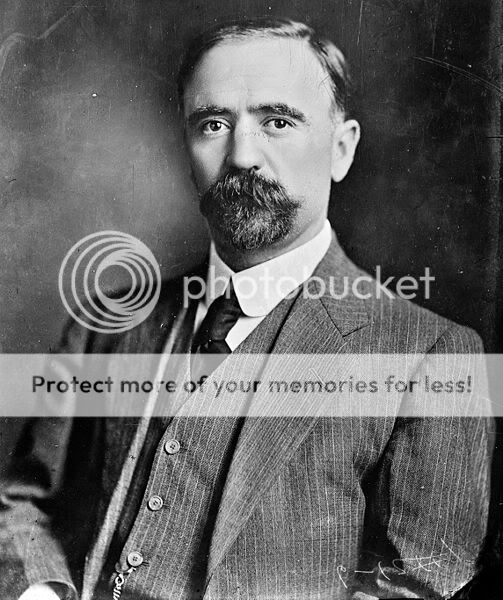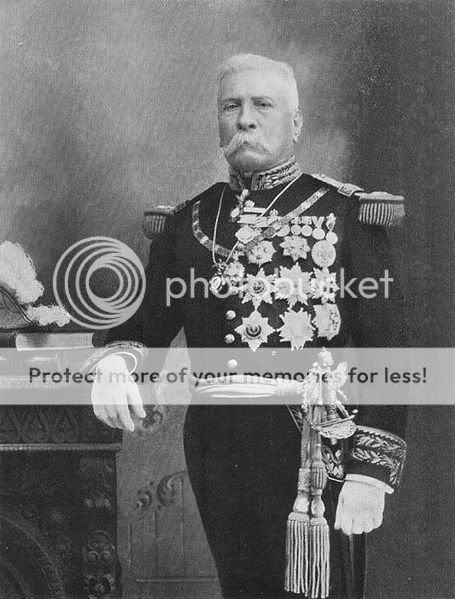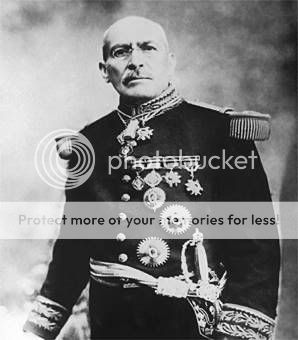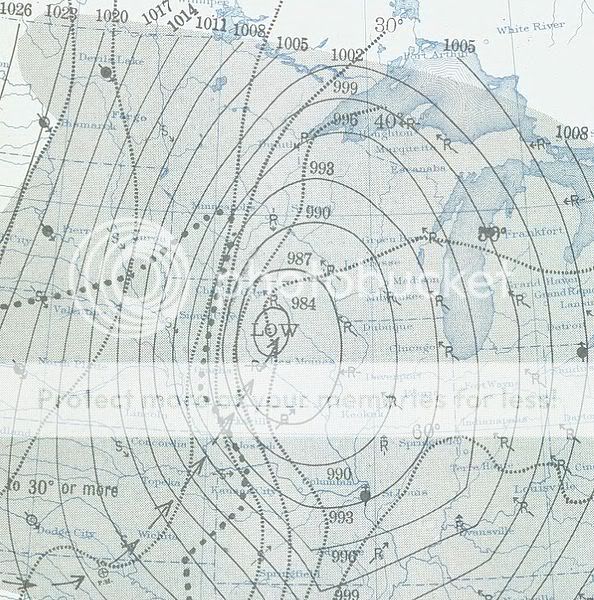1874. Joseph F. Glidden received his patent for barbed wire.
Barbed wire changed the nature of ranching and farming in the West. More than any other single physical item, barbed wire was responsible for the end of the open range and permanently established ranches with fenced pastures. It even changed the nature of the cowboy's work and employment, as it caused the rise of multiple smaller ranches with a small number of year around employees who worked cattle more and rode less.
1890 Francis E. Warren resigns as Governor, a position he had held as State Governor for only a little over a month, but which as Territorial Governor he had held for about a year. None the less, he holds the status of being Wyoming's first Governor. He resigned in order to take up his duties as a newly elected Senator, which oddly he had assumed a few days prior to his resignation as Governor.

Barber's time in office was marred by the Johnson County War, and his role in it suggests a potential weakness in his character. On a more positive note, he detected the shenanigans that had occurred with the design of the state's seal, and would not tolerate that, although even there he kept his first corrective efforts a secret after the story became controversial.

1916 The Cheyennne Leader for November 24, 1916: Villa defated at Chihuahua, Carranza delegates to confer with Carranza
A lot going on in this November 24 edition of the Tribune. But how much was accurate?
Things going badly for Villa? A near agreement with Carranza? And of course, the Great War.
1918 November 24, 1918. Cheyenne closes again, Horses being eaten in Russia, Revolution in Germany and Gasoline Alley
The papers were starting to report that the Spanish Flu Pandemic was easing, but in truth November was one of its peak years (and in other parts of the globe it'd rage on for the entire next year). Reality hit as things were closed back up.
As bad as that was, the horrors of the Russian Civil War were pushing their way onto the front page of the local papers. And there was legitimate reason to fear that the result of the Great War in Germany might be communist revolution throughout the defeated empires of Europe, a disaster that was being appreciated, if not perhaps in its full potential extent.
Elsewhere, in Chicago, the very first issue of Gasoline Alley made its appearance in the newspaper.
Gasoline Alley was, at first, only a Sunday paper in the black and white Sunday cartoons of the Chicago Tribune. It soon became a daily.
The cartoon strip was one that appeared regularly, and maybe still does, in the Denver Post and occasionally in the Rocky Mountain News and I used to read it there. It's a cartoon I like, but as it's a serial, its never one that I'm current on the story line so I was never up on what was going on in it. The interesting thing about it for years and years, beside the content of the cartoon in general, is that it was a celebration of American garage culture. In that context, it's pretty significant that it appeared in 1918 when automobiles, if not wholly new, were sill very much a new things. They'd become common enough to be the subject of a cartoon at this point, which says something.
1921 A serious fire in Gillette, WY destroyed several of the towns' landmark buildings.
1929 Senator Francis E. Warren died. At the time of his death, he had been a Senator longer than any other person in U.S. history. He was also the last Union veteran to serve in the U.S. Senate, a distinction in his case which was amplified by the fact that he was a recipient of the Congressional Medal of Honor, which perhaps explains his strong support of the Army while a Senator (which might also be explained by the fact that he was John J. Pershing's father-in-law). He was also the first Senator to hire a female secretary. His service was not without some blemishes, as a close association with the large stockmen side of the Johnson County War had given rise to questions about the extent of his association at that time, questions which nearly cost him his political career but which quickly passed.Colorado River Compact, 1922
The States of Arizona, California, Colorado, Nevada, New Mexico, Utah, and Wyoming, having resolved to enter into a compact under the Act of the Congress of the United States of America approved August 19, 1921 (42 Statutes at Large, page 171), and the Acts of the Legislatures of the said States, have through their Governors appointed as their Commissioners:
W.S. Norviel for the State of Arizona,
W.F. McClure for the State of California,
Delph E. Carpenter for the State of Colorado,
J.G. Scrugham for the State of Nevada,
Stephen B. Davis, Jr., for the State of New Mexico,
R.E. Caldwell for the State of Utah,
Frank C. Emerson for the State of Wyoming,
who, after negotiations participated in by Herbert Hoover appointed by The President as the representative of the United States of America, have agreed upon the following articles:
ARTICLE I
The major purposes of this compact are to provide for the equitable division and apportionment of the use of the waters of the Colorado River System; to establish the relative importance of different beneficial uses of water, to promote interstate comity; to remove causes of present and future controversies; and to secure the expeditious agricultural and industrial development of the Colorado River Basin, the storage of its waters, and the protection of life and property from floods. To these ends the Colorado River Basin is divided into two Basins, and an apportionment of the use of part of the water of the Colorado River System is made to each of them with the provision that further equitable apportionments may be made.
ARTICLE II
As used in this compact-
(a) The term “Colorado River System” means that portion of the Colorado River and its tributaries within the United States of America.
(b) the term “Colorado River Basin” means all of the drainage area of the Colorado River System and all other territory within the United States of America to which the waters of the Colorado River System shall be beneficially applied.
(c) The term “States of the Upper Division” means the States of Colorado, New Mexico, Utah, and Wyoming.
(d) The term “States of the Lower Division” means the States of Arizona, California, and Nevada.
(e) The term “Lee Ferry” means a point in the main stream of the Colorado River one mile below the mouth of the Paria River.
(f) The term “Upper Basin” means those parts of the States of Arizona, Colorado, New Mexico, Utah, and Wyoming within and from which waters naturally drain into the Colorado River System above Lee Ferry, and also all parts of said States located without the drainage area of the Colorado River System which are now or shall hereafter be beneficially served by waters diverted from the System above Lee Ferry.
(g) The term “Lower Basin” means those parts of the States of Arizona, California, Nevada, New Mexico, and Utah within and from which waters naturally drain into the Colorado River System below Lee Ferry, and also all parts of said States located without the drainage area of the Colorado River System which are now or shall hereafter be beneficially served by waters diverted from the System below Lee Ferry.
(h) The term “domestic use” shall include the use of water for household, stock, municipal, mining, milling, industrial, and other like purposes, but shall exclude the generation of electrical power.
ARTICLE III
(a) There is hereby apportioned from the Colorado River System in perpetuity to the Upper Basin and to the Lower Basin, respectively, the exclusive beneficial consumptive use of 7,500,000 acre-feet of water per annum, which shall include all water necessary for the supply of any rights which may now exist.
(b) In addition to the apportionment in paragraph (a), the Lower Basin is hereby given the right to increase its beneficial consumptive use of such waters by one million acre-feet per annum.
(c) If, as a matter of international comity, the United States of America shall hereafter recognize in the United States of Mexico any right to the use of any waters of the Colorado River System, such waters shall be supplied first from the waters which are surplus over and above the aggregate of the quantities specified in paragraphs (a) and (b); and if such surplus shall prove insufficient for this purpose, then, the burden of such deficiency shall be equally borne by the Upper Basin and the Lower Basin, and whenever necessary the States of the Upper Division shall deliver at Lee Ferry water to supply one-half of the deficiency so recognized in addition to that provided in paragraph (d).
(d) The States of the Upper Division will not cause the flow of the river at Lee Ferry to be depleted below an aggregate of 75,000,000 acre-feet for any period of ten consecutive years reckoned in continuing progressive series beginning with the first day of October next succeeding the ratification of this compact.
(e) The States of the Upper Division shall not withhold water, and the States of the Lower Division shall not require the delivery of water, which cannot reasonably be applied to domestic and agricultural uses.
(f) Further equitable apportionment of the beneficial uses of the waters of the Colorado River System unapportioned by paragraphs (a), (b), and (c) may be made in the manner provided in paragraph (g) at any time after October first, 1963, if and when either Basin shall have reached its total beneficial consumptive use as set out in paragraphs (a) and (b).
(g) In the event of a desire for a further apportionment as provided in paragraph (f) any two signatory States, acting through their Governors, may give joint notice of such desire to the Governors of the other signatory States and to The President of the United States of America, and it shall be the duty of the Governors of the signatory States and of The President of the United States of America forthwith to appoint representatives, whose duty it shall be to divide and apportion equitably between the Upper Basin and Lower Basin the beneficial use of the unapportioned water of the Colorado River System as mentioned in paragraph (f), subject to the legislative ratification of the signatory States and the Congress of the United States of America.
ARTICLE IV
(a) Inasmuch as the Colorado River has ceased to be navigable for commerce and the reservation of its waters for navigation would seriously limit the development of its Basin, the use of its waters for purposes of navigation shall be subservient to the uses of such waters for domestic, agricultural, and power purposes. If the Congress shall not consent to this paragraph, the other provisions of this compact shall nevertheless remain binding.
(b) Subject to the provisions of this compact, water of the Colorado River System may be impounded and used for the generation of electrical power, but such impounding and use shall be subservient to the use and consumption of such water for agricultural and domestic purposes and shall not interfere with or prevent use for such dominant purposes.
(c) The provisions of this article shall not apply to or interfere with the regulation and control by any State within its boundaries of the appropriation, use, and distribution of water.
ARTICLE V
The chief official of each signatory State charged with the administration of water rights, together with the Director of the United States Reclamation Service and the Director of the United States Geological Survey shall cooperate, ex-officio:
(a) To promote the systematic determination and coordination of the facts as to flow, appropriation, consumption, and use of water in the Colorado River Basin, and the interchange of available information in such matters.
(b) To secure the ascertainment and publication of the annual flow of the Colorado River at Lee Ferry.
(c) To perform such other duties as may be assigned by mutual consent of the signatories from time to time.
ARTICLE VI
Should any claim or controversy arise between any two or more of the signatory States:
(a) with respect to the waters of the Colorado River System not covered by the terms of this compact;
(b) over the meaning or performance of any of the terms of this compact;
(c) as to the allocation of the burdens incident to the performance of any article of this compact or the delivery of waters as herein provided;
(d) as to the construction or operation of works within the Colorado River Basin to be situated in two or more States, or to be constructed in one State for the benefit of another State; or
(e) as to the diversion of water in one State for the benefit of another State; the Governors of the States affected, upon the request of one of them, shall forthwith appoint Commissioners with power to consider and adjust such claim or controversy, subject to ratification by the Legislatures of the States so affected. Nothing herein contained shall prevent the adjustment of any such claim or controversy by any present method or by direct future legislative action of the interested States.
ARTICLE VII
Nothing in this compact shall be construed as affecting the obligations of the United States of America to Indian tribes.
ARTICLE VIII
Present perfected rights to the beneficial use of waters of the Colorado River System are unimpaired by this compact. Whenever storage capacity of 5,000,000 acre-feet shall have been provided on the main Colorado River within or for the benefit of the Lower Basin, then claims of such rights, if any, by appropriators or users of water in the Lower Basin against appropriators or users of water in the Upper Basin shall attach to and be satisfied from water that may be stored not in conflict with Article III. All other rights to beneficial use of waters of the Colorado River System shall be satisfied solely from the water apportioned to that Basin in which they are situate.
ARTICLE IX
Nothing in this compact shall be construed to limit or prevent any State from instituting or maintaining any action or proceeding, legal or equitable, for the protection of any right under this compact or the enforcement of any of its provisions.
ARTICLE X
This compact may be terminated at any time by the unanimous agreement of the signatory States. In the event of such termination all rights established under it shall continue unimpaired.
ARTICLE XI
This compact shall become binding and obligatory when it shall have been approved by the Legislatures of each of the signatory States and by the Congress of the United States. Notice of approval by the Legislatures shall be given by the Governor of each signatory State to the Governors of the other signatory States and to the President of the United States, and the President of the United States is requested to give notice to the Governors of the signatory States of approval by the Congress of the United States.
IN WITNESS WHEREOF, the Commissioners have signed this compact in a single original, which shall be deposited in the archives of the Department of State of the United States of America and of which a duly certified copy shall be forwarded to the Governor of each of the signatory States.
DONE at the City of Santa Fe, New Mexico, this twenty-fourth day of November, A.D. One Thousand Nine Hundred and Twenty-two. W. S. NORVIEL W. F. McCLURE DELPH E. CARPENTER J. G. SCRUGHAM STEPHEN G. DAVIS, JR. R. E. CALDWELL FRANK C. EMERSON
Approved: HERBERT HOOVER
1968 Expedition Island in the Green River was designated as a National Historic Landmark. The island is a park in Green River, WY and marks the location where Major John Wesley Powell began his expedition down the Green River and Colorado River in 1871.
1990 In one of Wyoming's most infamous murder cases, 15-year-old James "Jamie" Wiley shot and killed his stepmother Becky, brothers, Jesse (age 13), Willy (age 10), and Tyrone (age 5) and then set the house on fire.
2000 A magnitude 4.6 earthquake occurred about 82 miles from Cody, WY.
2011 Today is Thanksgiving Day for 2011.










































